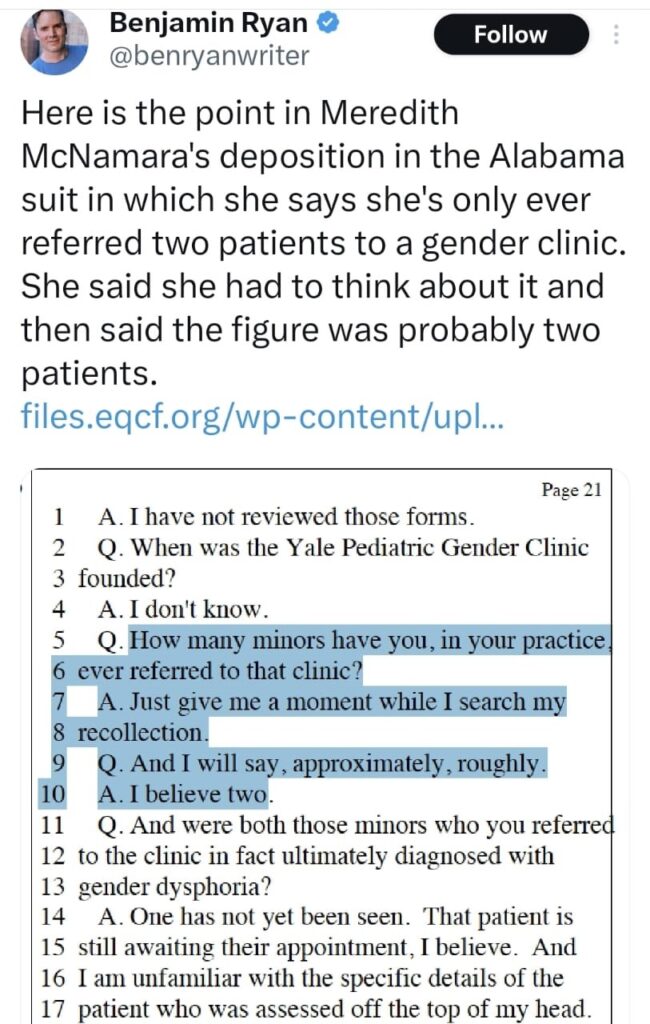The Yale Integrity Project (YIP) report was released by the Yale Law School in response to the Cass Review in July 2024: “An Evidence-Based Critique of “The Cass Review” on Gender-affirming Care for Adolescent Gender Dysphoria”. This critique has multiple problems. We will publish a series of articles to explain them, rather than trying to cover it all in this article. This is article one in the series.
The Independent Review of Gender Identity Services for Children and Young People – also called the Cass Review – was released in the UK on 10 April 2024. Led by a highly respected paediatrician and former president of the Royal College of Paediatrics and Child Health, Dr Hilary Cass, the review is the culmination of a 4-year investigation into how the NHS provided care to children and young people with gender dysphoria at the largest gender clinic in the world – the Tavistock Gender Identity Development Service (GIDS).
The Final Report of the Cass Review is 388-pages long and is informed by nine studies, which were commissioned by the Cass Review, forming the Cass quantitative research programme.
One of the central conclusions that sets the foundation of the Final Report is that the “gender-affirming” medical interventions such as puberty blockers and cross-sex hormones, previously provided to minors in the GIDS service, were based on “wholly inadequate evidence”.
It is understandable that professionals who have promoted the medicalised treatment options that form part of the “gender affirming care” approach for minors such as social transitions, puberty blockers, cross sex hormones and surgeries, have much to lose on many fronts. These include the sense of being morally right, their professional reputation and the loss of potential and actual clients in a privatised health system, as the medical evidence emerging around this subject is becoming clearer. It is unsurprising that these providers might resist being challenged and attempt to defend practices which they have promoted and participated in over the past decade.
The authors of the Yale Integrity Project lack integrity
The YIP report states that most of the Cass Review’s known contributors have neither research nor clinical experience in “transgender healthcare’’, and then it states that by contrast, the YIP report was authored by a team of researchers and clinicians that has “86 years of experience working with 4,800 transgender youth”, and “has published 278 peer-reviewed studies, 168 of which are related to gender-affirming care.” These claims cannot be easily verified, and evidence is not provided to support them.
The reality is that Dr Cass is a senior, experienced and respected paediatrician in the NHS, who has appropriate qualifications and no conflict of interest. The Cass Review was guided and challenged by the Assurance Group, comprising seven independent experts across a range of disciplines, again with no conflicts of interest. Meanwhile the respected academic researchers at York University conducting the systematic reviews were also independent, with no conflicts of interests.
The lead author of the YIP report is Dr Meredith McNamara (MD MSc, Assistant Professor of Paediatrics, Yale School of Medicine), a far less experienced clinician and researcher than Dr Cass and other contributors to the Cass Review. Dr McNamara admitted that she has only ever referred two patients to a gender clinic in her career as can been seen in this screen shot below, from a post on X by journalist Ben Ryan:

Another of the YIP authors, Turban, authored a paper in 2022: “Access to gender-affirming hormones during adolescence and mental health outcomes among transgender adults” in which he claimed that:
“People who accessed GAH [cross-sex hormones] during early or late adolescence had a lower odds of past-month suicidal ideation and past-month severe psychological distress in adulthood, when compared to those who desired but did not access GAH [cross-sex hormones].”
This study was conducted using a large online survey of Americans who “identified as transgender, non-binary, or cross-dressers.”
There were some problems with Turban’s research that have been written about by Prof Michael Biggs. There was a failure to adjust for confounding variables that Turban had claimed had significant effect in his own previous papers, such as for puberty blockers and surgeries.
But what was most surprising was that Turban had grouped those who were males and had received oestrogen with those who were females and had received testosterone, claiming as a general conclusion for all participants, that access to cross sex hormones “during adolescence and adulthood is associated with favorable mental health outcomes compared to desiring but not accessing.”
However, if the testosterone and oestrogen groups are separated in his data set, it can be seen that the females on testosterone had some short-term improvement in mental health (though it is difficult to separate the effect from the known short term anti-depressant effect of testosterone), but the males on oestrogen did worse. By combining the groups, he avoided reporting the bad outcomes of the group on oestrogen.
Biggs concludes about Turban’s research:
“Perhaps one could claim that the survey provides some evidence that testosterone reduces distress and suicidality in females. But then one must also admit that it also provides evidence that estrogen increases suicidality in males and that puberty blockers offer no benefit. It is not legitimate to pick out the results ostensibly favoring medical intervention while ignoring equally credible evidence for its detrimental effects. The real question is why the authors return again and again to this online survey – which did not even measure the condition supposed to be treated, namely gender dysphoria – rather than conducting randomized control trials or collecting longitudinal patient data.”
This “oversight” suggests a lack of honesty and integrity.
The YIP report acknowledges and thanks Annelou de Vries (MD, PhD) for “expert feedback on drafts of this report.” De Vries is the author of the two well-known, and now infamous, “Dutch Studies” which catalysed the global spread of the medicalisation of youth with gender dysphoria. Numerous problems with these studies have been pointed out in, among others, “The Myth of “Reliable Research” in Pediatric Gender Medicine: A critical evaluation of the Dutch Studies-and research that has followed.”
One of the significant criticisms is that the participants were given different questionnaires to rate their gender dysphoria at the end compared to the start of the study. The questionnaire at the beginning was for their natal sex, and then at the end they were given a questionnaire for the opposite sex. The effect of this is that the scores of the final questionnaires reportedly showing improvement in gender dysphoria are unreliable.
Ideology above evidence
What drives a lack of integrity in research? Being a self-proclaimed “expert” in gender medicine is not sufficient grounds to direct what should be considered best medical care. Appropriate management of conflict of interest is a cornerstone of sound evidence-based medicine. Without impartial assessment, personal biases will continue to obscure the evidence.
A known example of an ideological activist agenda blending itself into medical recommendations is illustrated by Dr Jack Drescher, a psychoanalyst and psychiatrist known for his work in gender identity and sexual orientation. Drescher is not an author of the YIP report, but he is listed as a member of the advisory committee for the Yale Equity Science (YES) project of the Yale Law School. Drescher, as journalist Bernard Lane has written, openly described his approach in influencing public and medical opinion around issues of gender identity and sexual orientation. These include:
- Adopting and insisting upon the use of normative language to replace medical terminology
- Labelling theories that contradict affirmative perspectives as unscientific
- Ad hominem and ad feminam attacks on professionals
- Targeting youth politicians
- De-medicalising the campaign
- Getting ahead of the government agenda and the media story
- Using human rights as a campaign point
- Tying your campaign to more popular reform
- Avoiding excessive press coverage and exposure.
When integrity in research and evidence gives way to activism, it prompts questions about motivation.
The Oxford English dictionary defines integrity as: “In moral sense. Soundness of moral principle; the character of uncorrupted virtue, esp. in relation to truth and fair dealing; uprightness, honesty…”.
There is a lot more that can be said about the authors of the YIP report, but we will pause here and look at some of the content of the report in our next article.
